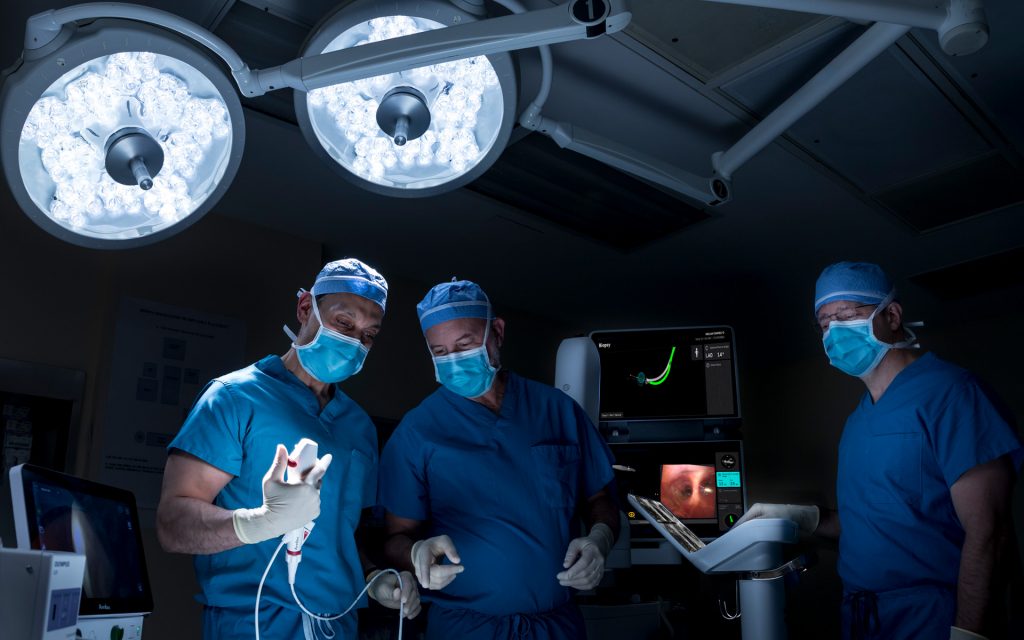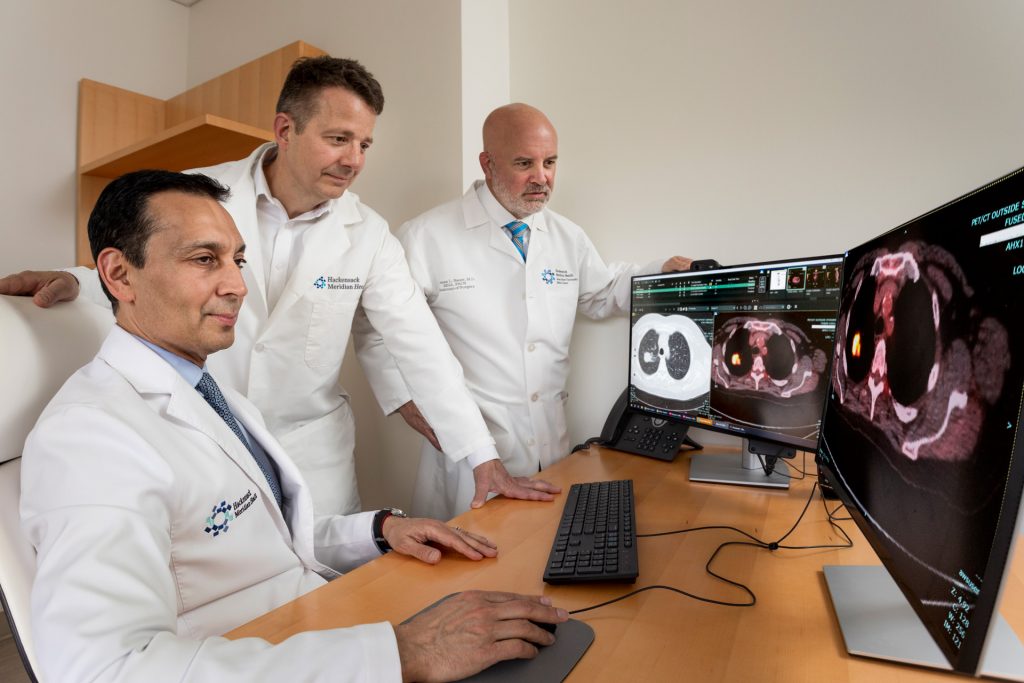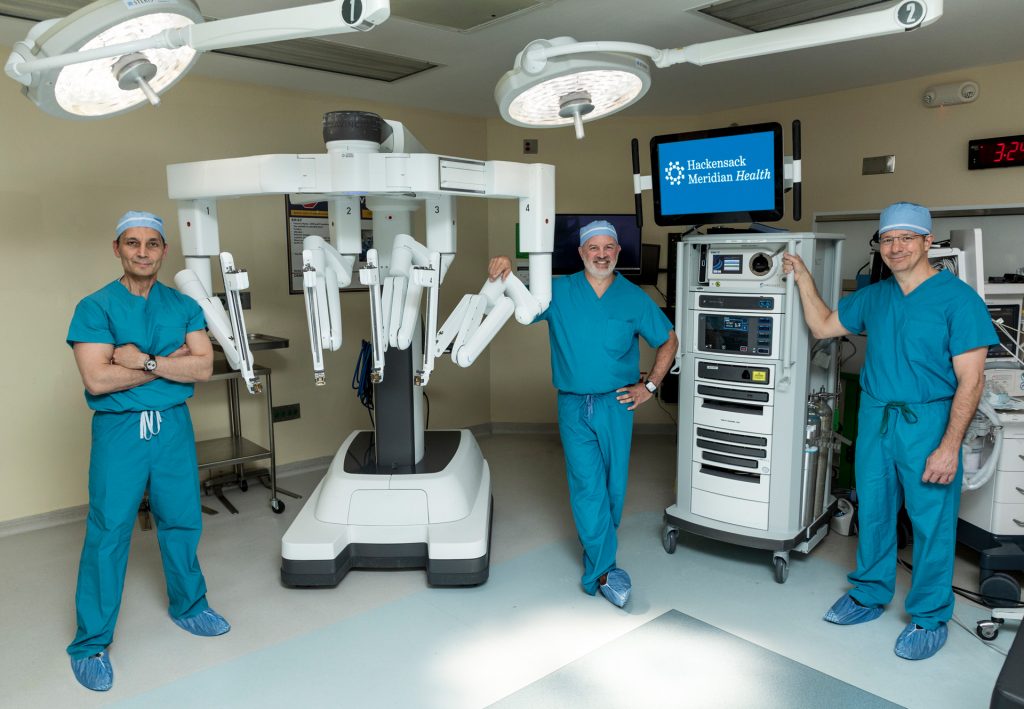HACKENSACK MERIDIAN HEALTH IS LEADING THE CHARGE IN ELEVATING THORACIC CARE, DIAGNOSING AND TREATING EVEN THE MOST COMPLEX LUNG AND AIRWAY DISEASES – INCLUDING THE WORLD’S DEADLIEST FORM OF CANCER
BY AMANDA McCOY • PHOTOS BY AMESSE PHOTOGRAPHY
Lung cancer remains the leading cause of cancer deaths in both men and women, throughout the United States and world wide. In fact, according to data from the American Cancer Society, lung cancer claims the lives of more Americans every year than the next three most common cancers combined (breast, colon, and prostate). The reason behind this high mortality rate is not because the cancer is untreatable; it’s because early stage lung cancers, when they are most treatable, tend to grow silently, with symptoms not appearing until the tumor has already begun to grow and spread.

Hackensack Meridian Health is driving new advancements that are tackling lung cancer’s high mortality rate head-on. These include cutting-edge screening technology, paired with next-level robotic capabilities, both of which help physicians catch – and treat – lung cancer sooner.
“Lung cancer is the most lethal cancer in both men and women, and diagnosing it at the earliest stage possible makes all the difference in survival,” said Faiz Bhora, M.D., professor and regional chair of Surgery, chief of Thoracic Surgery, and director of the Advanced Lung & Airway Center at JFK University Medical Center. “Lung cancers detected in the earliest stage are up to 95% treatable.”
According to data from the Centers for Disease Control and Prevention, more than 60% of lung cancer diagnoses occur in stages 3 or 4 (which are more advanced stages). The thoracic leadership team across Hackensack Meridian Health is on a mission to shrink that number. Bayshore Medical Center is the first hospital in New Jersey to offer and utilize the ground breaking Galaxy System™, an industry-first single-use bron choscope that can diagnose and treat lung nodules sooner while reducing the potential for infection.

“This bronchoscope system allows us to go deep into the lung and reach the smallest of hard-to-reach nodules, biopsy them, and in most cases detect cancers earlier than we could previously,” continued Dr. Bhora. “This bends the arc toward early diagnosis and treatment.”
Hackensack Meridian Health has long been an early adopter of the latest in robotic diagnostic and treatment tech. The new technology complements the network’s existing advanced bronchoscopy capabilities, including the ION Robotic Bronchoscopy system available at multiple Hackensack Meridian Health locations. “Ion is a wonderful, state-of-the-art tool that enables physicians to see and reach all areas of the lungs with great precision to obtain the best nodule samples for testing,” said Thomas Bauer, M.D., chair of Surgery and chief of Thoracic Surgery at Jersey Shore University Medical Center, and chair of Thoracic Surgery for the southern region. “I can biopsy smaller abnormalities and reach more areas that were previously much more difficult to pinpoint.”
When a lung cancer diagnosis is made, patients are con-nected to a seamless network of medical expertise, encompass ing medical oncology, radiation oncology, pulmonology, gastroenterology, interventional radiology, pathology, and anesthesiology. Patients are presented at a thoracic tumor board held every week to devise a personalized treatment plan, ensuring the best course of action is taken for each individual.

“We are high volume, but we are not a factory,” said Dr. Bhora. “We provide truly personalized care for every patient. We build teams around patients, and treat each one as a unique individual.”
“We minimize how much we need to put patients through to get the appropriate care,” added Nabil Rizk, M.D., chief of the Division of Thoracic Surgery at Hackensack University Medical Center, professor of Surgery at Hackensack Meridian School of Medicine, and chair of Thoracic Surgery for the northern region. “We do minimal X-rays and modify surgical techniques so patients can go home quicker. They are typically up and walking the day after surgery. We don’t restrict activity.
We optimize outcomes to give them the best quality of life.”
While Hackensack Meridian Health maintains its expertise in traditional open surgery, more than 90% of lung cancer surgeries are performed robotically. The health network is a pioneer in robotic technology and has multiple robotic systems at hospitals throughout the state.
“Most hospitals in the country are using the prior genera tion, while our network has three of the newest robots,” said Dr. Bauer. “We’re helping to refine this generation so when it does get implemented across the country, the work and experience we’ve had with it will help guide other institutions. It’s an example of how our team is leading change in the robotic world.”
“Robotic-assisted procedures offer a wide array of benefits, including less blood loss, more accuracy, quicker recovery, and a shorter hospital stay, meaning patients are able to get back to their daily routines sooner,” said Dr. Rizk. Nationally, the average length of stay post lung cancer surgery is about four days; at Hackensack Meridian Health, it’s less than two days.
Every patient also has access to Hackensack Meridian Health’s vast network of clinical trials and specialized centers. Even amid groundbreaking diagnostic and treatment advance ments, the physicians explained there are still roadblocks in the f ight to decrease lung cancer deaths.

“Adoption of lung cancer screening has unfortunately been slow compared to many other cancers, like breast and colon,” noted Dr. Rizk. “There are guidelines – smokers aged 50 or older who have smoked a pack a day for 20 years and people with a strong family history of lung cancer – and there is an opportunity for physicians to encourage more eligible patients to get screened.”
“There are a lot of misconceptions we’re still battling,” added Dr. Bauer. “Many patients believe they’ll undergo dangerous levels of radiation if they get screened, but that’s not true. Some also believe lung cancer is a death sentence, but with our advanced screening programs, we can detect and therefore treat lung cancer early when the odds of successful treatment are in our favor. Lastly, there’s a fear that doctors will perform needless tests and procedures. At Hackensack Meridian Health, we identify the best and least invasive treatment plan for each unique person.”
In addition to lung cancer, Hackensack Meridian Health’s thoracic experts treat a full range of lung and airway diseases, from breathing disorders and esophageal cancer to rare and serious conditions like phrenic nerve injury and diaphragm paralysis. In fact, Jersey Shore University Medical Center is one of only five Global Health Accredited hospitals in the U.S. based on its Center for Paralysis and Reconstructive Nerve Surgery, which attracts patients from around the world and performs phrenic nerve grafting and diaphragm pacing for patients who, after a serious injury or disease of the spinal cord, struggle to breathe on their own.
With leading-edge technology, a commitment to personalized care, and a dedication to advancing the field, Hackensack Meridian Health offers patients a beacon of hope in the fight against lung cancer and other thoracic conditions.
Hackensack Meridian Health hackensackmeridianhealth.org/thoracicsurgery
